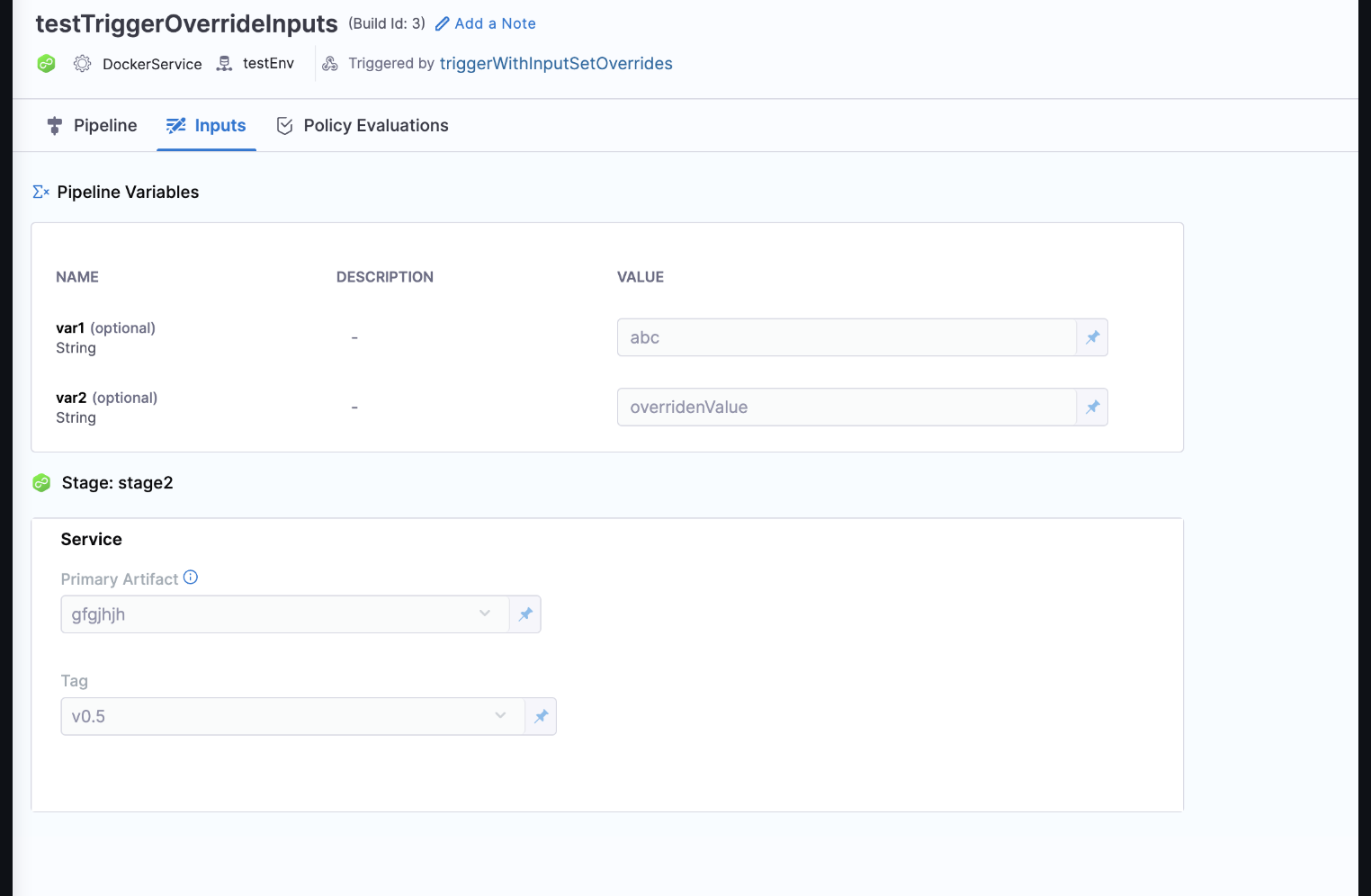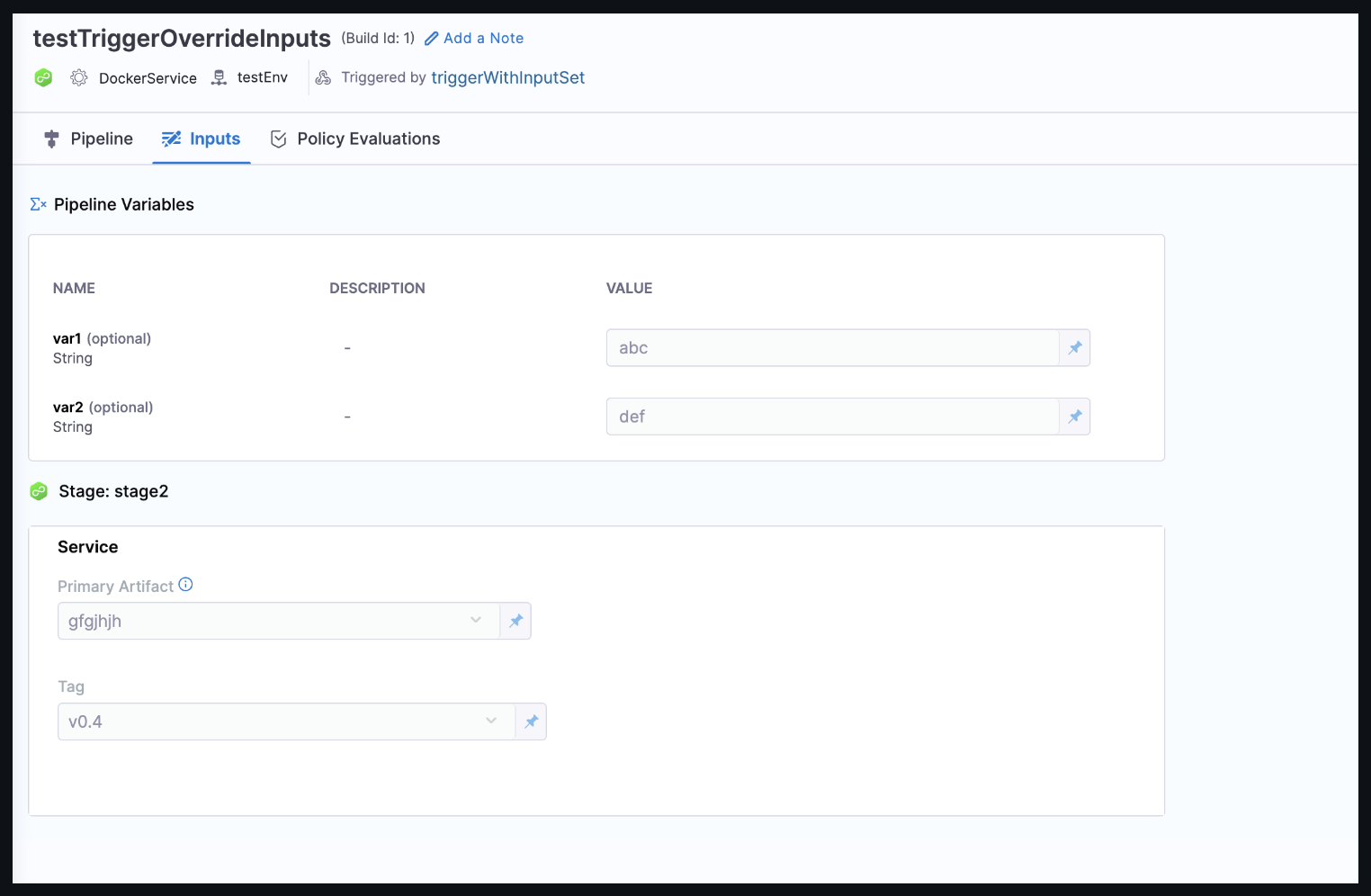Override pipeline input provided using input set in Trigger configuration
For instance, consider a pipeline that requires a Service input among others. While most inputs can be predefined in an Input Set, the Service name needs to be extracted from the trigger payload.
Previously, triggering a pipeline allowed either using all values from an Input Set or defining all values directly in the trigger configuration. With the support of overriding pipeline input using input YAML in trigger, it is possible to reuse the input set and supply specific input values for pipeline in trigger configuration. This flexibility enables users to provide specific details, like the Service Name, directly from the trigger payload while utilizing the rest of the inputs from the predefined Input Set.
You can only customize input parameters using YAML in this setup.
Let's go through the feature with an example:
Suppose you have a trigger referring to an Input set myInputSet :
trigger:
name: triggerWithInputSet
identifier: triggerWithInputSet
enabled: true
description: ""
tags: {}
stagesToExecute: []
orgIdentifier: default
projectIdentifier: test
pipelineIdentifier: testTriggerOverrideInputs
source:
type: Webhook
spec:
type: Custom
spec:
payloadConditions: []
headerConditions: []
inputSetRefs:
- myInputSet
Input Set:
inputSet:
name: myInputSet
tags: {}
identifier: myInputSet
orgIdentifier: default
projectIdentifier: test
pipeline:
identifier: testTriggerOverrideInputs
stages:
- stage:
identifier: stage2
type: Deployment
spec:
service:
serviceInputs:
serviceDefinition:
type: Kubernetes
spec:
artifacts:
primary:
primaryArtifactRef: gfgjhjh
sources:
- identifier: gfgjhjh
type: Gcr
spec:
tag: v0.4
variables:
- name: var1
type: String
value: abc
- name: var2
type: String
value: def
We observe that the artifact tag, as well as var1 and var2 are coming from the input set.

If you want to change the tag to v0.5 during the pipeline trigger execution, you can define an inputYaml in the trigger YAML. The inputYaml is similar to the Input set YAML; you only need to modify the value of the variable you want to override.
trigger:
name: triggerWithInputSetOverrides
identifier: triggerWithInputSetOverrides
enabled: true
description: ""
tags: {}
stagesToExecute: []
orgIdentifier: default
projectIdentifier: test
pipelineIdentifier: testTriggerOverrideInputs
source:
type: Webhook
spec:
type: Custom
spec:
payloadConditions: []
headerConditions: []
inputSetRefs:
- myInputSet
inputYaml: |
pipeline:
identifier: triggerWithInputSetOverrides
stages:
- stage:
identifier: stage2
type: Deployment
spec:
service:
serviceInputs:
serviceDefinition:
type: Kubernetes
spec:
artifacts:
primary:
primaryArtifactRef: gfgjhjh
sources:
- identifier: gfgjhjh
type: Gcr
spec:
tag: v0.5
variables:
- name: var2
type: String
value: overridenValue

We observe that the artifact tag and var2 are coming from the override inputs. var1 is still coming from the input set, since we didn't override it in the trigger's YAML.
- When
inputYamlis provided, the user-supplied values take precedence over all other configurations. In other words, any values specified in theinputYamlsection will override and take preference over the corresponding values in the Input Set. - It's crucial to structure the
inputYamlsimilarly to what is defined in the Pipeline Input Set. Additionally, ensure that you provide the correct pipeline, stage, or stepidentifier. - If you have an array structure in the Input YAML and need to override one of its values you need to provide the entire array structure in the input YAML, you cannot override only one part of the array.